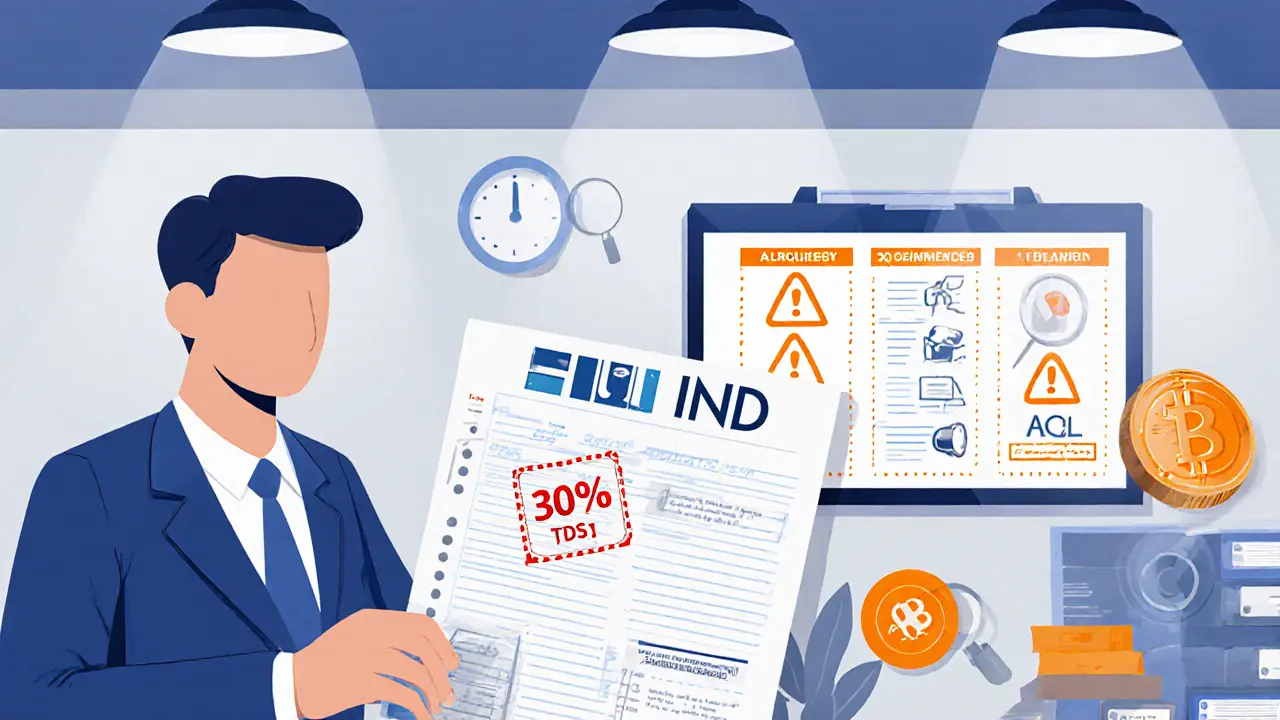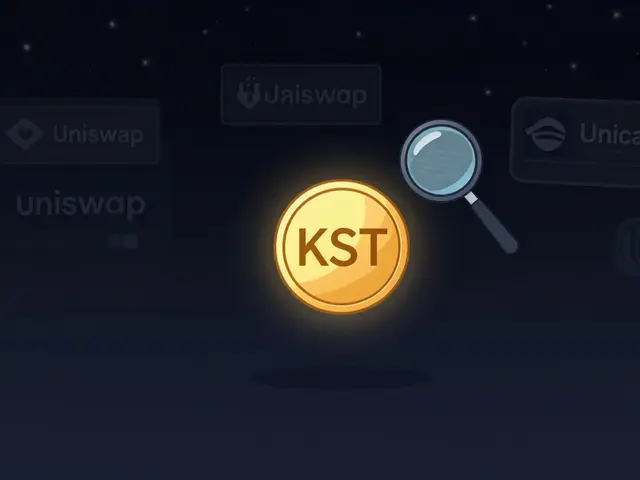Indian Crypto Business Compliance Checker
Compliance Status
Wondering if you can start taking crypto payments in India without landing in legal trouble? The short answer is: you can run a crypto‑focused business, but you can’t use crypto as a direct payment method for goods or services. The rules sit in a legal grey zone, layered with heavy tax, AML and registration mandates. Below is a practical roadmap that walks you through what the law says, what you must file, and how to stay on the right side of regulators.
Quick Takeaways
- Crypto businesses are allowed to operate, but they must register with the FIU‑IND and follow strict KYC/AML rules.
- All crypto income is taxed at a flat 30% plus 4% cess; a 1% TDS applies on every transfer.
- Using crypto as a payment method for retail sales is not permitted under current regulations.
- Non‑compliance can attract multi‑crore fines - Binance paid INR18.82cr, Bybit INR9.27cr.
- The upcoming COINS Act 2025 could reshape the landscape, potentially legalising crypto payments.
Legal Landscape in 2025
India’s approach to digital assets can be summed up as a "legal grey area". The Supreme Court’s 2020 decision in Internet and Mobile Association of India v Reserve Bank of India lifted the RBI’s blanket ban on crypto transactions, but it left the door open for future legislation. As of October2025, no law outright bans crypto, yet the government treats it as a Virtual Digital Asset (VDA) under Section2(47A) of the Income Tax Act, 1961. This classification means crypto is recognized for tax purposes but not as legal tender.
Tax Obligations
Since the Income Tax (No.2) Bill received presidential assent on 22August2025, the tax regime for VDAs is crystal clear:
- Flat 30% tax on net gains, plus a 4% health & education cess.
- Only the acquisition cost is deductible; trading fees, interest, or other expenses cannot be claimed.
- A 1% Tax Deducted at Source (TDS) is levied on every crypto transfer, irrespective of amount.
Businesses must file quarterly TDS returns and reconcile them with their annual income tax filing. Missing a TDS payment triggers interest and penalties that can quickly erode profit margins.
AML, KYC and Registration Requirements
In March2023, crypto service providers were brought under the Prevention of Money Laundering Act (PMLA). This move mandated:
- Bank‑level Know‑Your‑Customer (KYC) verification for every user.
- Continuous transaction monitoring to spot suspicious patterns.
- Mandatory registration with the Financial Intelligence Unit - India (FIU‑IND). Both domestic and foreign exchanges serving Indian customers must be FIU‑IND‑registered.
Failure to register can result in fines exceeding INR10crore, as seen with Binance and Bybit. The FIU‑IND also enforces the FATF Travel Rule with zero threshold - every crypto transfer must include sender and receiver details, a requirement that pushes businesses to invest in robust compliance infrastructure.
Can You Accept Crypto as Payment?
The short answer: No. While buying, selling, and holding crypto is legal, the government has explicitly ruled that crypto cannot be used as a substitute for Indian rupees in retail transactions. This restriction applies to:
- E‑commerce sites wishing to list crypto as a checkout option.
- Physical stores attempting to accept Bitcoin or any other token for goods.
- Service providers (e.g., freelancers) trying to invoice in crypto without an intermediary exchange.
Violations can attract action from the RBI and the Ministry of Finance, which have repeatedly cautioned the public about crypto’s volatility and macro‑economic risks.

Future Outlook - The COINS Act 2025
The Comprehensive Regulation of Cryptographic Assets (COINS) Act 2025 is currently under parliamentary review. If enacted, it would:
- Formally define crypto assets and grant them a legal status similar to securities.
- Introduce a licensing framework for exchanges, likely overseen by the Reserve Bank of India (RBI).
- Potentially allow crypto as a payment method under strict consumer‑protection clauses.
- Clarify tax deductions for trading fees and streamline the TDS mechanism.
Until the COINS Act becomes law, businesses must operate under the existing regime.
Practical Compliance Checklist
| Requirement | Regulating Authority | Penalty for Non‑Compliance | Current Status (Oct2025) |
|---|---|---|---|
| FIU‑IND registration | FIU‑IND | Fine up to INR10cr per violation | Mandatory for all crypto platforms |
| 30% VDA tax + 4% cess | Income Tax Department (CBDT) | Interest + penalties up to 25% | Effective since FY2022‑23 |
| 1% TDS on every crypto transfer | Income Tax Department | Penalty of INR200 per default filing | Mandatory from April2023 |
| KYC/AML under PMLA & FATF Travel Rule | FIU‑IND & RBI | Fines up to INR18.82cr (e.g., Binance) | Zero‑threshold Travel Rule in force |
| Prohibition on crypto as legal tender | Ministry of Finance & RBI | Enforcement action, possible seizure | Current legal position |
Follow this checklist each quarter to avoid surprise penalties.
Step‑by‑Step Guide to Launch a Crypto‑Focused Business in India
- Choose a legal structure (private limited, LLP, etc.) and register with the Ministry of Corporate Affairs.
- Apply for FIU‑IND registration. Prepare detailed KYC policies, AML officer appointment, and transaction monitoring tools.
- Set up accounting software that can handle VDA taxation. Flag every crypto transaction for 1% TDS calculation.
- Open a corporate bank account. Be ready for additional due diligence; many banks require proof of FIU‑IND registration.
- Implement the FATF Travel Rule: ensure every outbound/inbound transaction logs sender‑receiver name, address, and transaction hash.
- File quarterly TDS returns on the GST portal (the same platform now handles crypto TDS).
- Prepare annual tax filing: report net VDA gains, apply the 30% tax, and pay the 4% cess.
- Stay updated on COINS Act progress; adjust licensing and consumer‑protection measures as needed.
Common Pitfalls and How to Avoid Them
- Ignoring the 1% TDS: Many startups treat crypto like a peer‑to‑peer asset and miss the TDS step, leading to cash‑flow crunches.
- Using a regular bank for crypto deposits: Some banks freeze accounts after a few crypto‑related transactions. Keep a dedicated fintech partner that understands VDA compliance.
- Assuming crypto is legal tender: Advertise clearly that you accept crypto only for investment or exchange services, not as payment for goods.
- Under‑estimating AML costs: Compliance platforms can cost INR2‑3lakhs per year, but skimping on them invites hefty fines.
Frequently Asked Questions
Frequently Asked Questions
Is it illegal for an Indian retailer to accept Bitcoin for a sale?
Yes. Current regulations prohibit using crypto as a direct payment method for goods or services. Retailers can only offer crypto‑related services such as exchange or advisory, not settlement of sales in crypto.
Do I need to register with the FIU‑IND if I only hold crypto for my own business treasury?
No. FIU‑IND registration applies to entities that provide crypto‑related services to third parties (exchange, wallet, advisory). Simply holding crypto in a corporate treasury does not trigger registration, but you must still account for the 30% tax and TDS on any internal transfers.
How is the 1% TDS calculated?
The 1% is applied to the gross value of each crypto transfer in INR terms, based on the spot price at the time of transfer. The sender must deduct this amount and remit it to the government via the quarterly TDS return.
What are the consequences of missing a TDS payment?
The Income Tax Department imposes a penalty of INR200 per default filing, plus interest on the unpaid amount. Repeated defaults can trigger a notice for tax evasion, which may lead to higher penalties and scrutiny of the business.
When is the COINS Act expected to become law?
The COINS Act is currently in the parliamentary committee stage. Analysts predict a final vote sometime in 2026, but the timeline remains uncertain. Businesses should monitor parliamentary updates and prepare to adapt their compliance frameworks accordingly.












People Comments
India's crypto regs are a nightmare; trying to run a business there feels like walking on a minefield. The government keeps tossing new taxes and compliance hoops, and anyone who dares to accept Bitcoin for a coffee will get slapped with fines. If you want to stay alive, stick to exchange services and keep the crypto out of your cash register. The guide's right about the payment ban, but it's missing the fact that enforcement is brutal.
India should just ban crypto outright. Any business that even thinks about it is asking for trouble.
The regulatory framework delineated herein mandates explicit registration with the Financial Intelligence Unit-India (FIU‑IND) for any entity furnishing crypto‑related services. Moreover, the imposition of a flat thirty‑percent tax coupled with a one‑percent Tax Deducted at Source imposes a substantial fiscal burden. Entities must also institute rigorous Know‑Your‑Customer protocols as prescribed under the Prevention of Money Laundering Act. Consequently, adherence to these stipulations is indispensable for sustainable operation.
Yo, the guide pretends the COINS Act will magically solve everything, but politicians love to stall. Meanwhile, startups get hammered for missing a TDS payment they didn't even know existed. So treat this as a survival manual, not a promise of freedom.
Alright, let me break this down for anyone who’s feeling lost in the tax jungle.
First off, every crypto‑related service has to register with the FIU‑IND – no exceptions, even if you’re just holding coins for the company treasury.
Second, the tax rate is a flat 30% on any net gains, plus a 4% health and education cess – that’s a huge chunk, so plan your cash‑flow accordingly.
Third, don’t forget the 1% TDS on every transfer; it’s applied to the INR value of the crypto at the time of the move, and you have to remit it quarterly.
Fourth, you can’t deduct trading fees or interest – only the original acquisition cost counts, which makes it harder to lower your taxable base.
Fifth, set up an accounting system that can tag each transaction with its INR valuation, otherwise you’ll end up scrambling during the TDS filing.
Sixth, most banks in India are still wary of crypto; you’ll likely need a fintech partner that already has a relationship with a bank willing to handle VDA transactions.
Seventh, the AML rules are strict – you need a dedicated KYC/AML officer, automated monitoring, and you must keep records for at least five years.
Eighth, the FATF Travel Rule means every inbound and outbound transfer must include sender‑receiver details, so your wallet solution must be able to embed that metadata.
Ninth, if you ever consider accepting crypto as payment for goods, hold up – it’s currently prohibited, and you could face multi‑crore fines.
Tenth, keep an eye on the upcoming COINS Act – if it passes, it might open up a regulated path for crypto payments, but until then you’re stuck with the status‑quo.
Eleventh, file your quarterly TDS returns on the GST portal; missing a deadline triggers a flat INR200 penalty per filing plus interest.
Twelfth, make sure your annual tax return reflects the net VDA gains and the 4% cess – the tax department cross‑checks this against the FIU‑IND data.
Thirteenth, maintain a compliance diary – note every regulatory update, because the rules can shift quickly.
Fourteenth, consider getting a compliance audit from a reputable firm before the year‑end to avoid nasty surprises.
Fifteenth, always keep a legal counsel in the loop; crypto law is still evolving and a proactive approach can save you from costly litigation.
Lastly, stay patient and thorough – the crypto space in India is a marathon, not a sprint, and diligent compliance will keep your business afloat.
Good points, especially the bit about dedicated fintech partners for banking. Also, I'd add that using a modular accounting system simplifies the 1% TDS calculations.
Considering the broader economic canvas, one might argue that cryptocurrency represents a double‑edged sword; it offers unparalleled liquidity, yet it threatens sovereign monetary control, thereby inviting regulatory scrutiny; consequently, businesses must navigate this paradox with prudence.
The author neglects to mention that many firms have suffered crippling freezes from banks, a fact that should have been foregrounded; the compliance costs outlined are merely the tip of the iceberg; without robust internal controls, fines will erode any profit margin.
I appreciate the comprehensive checklist; it provides a clear roadmap for compliance, and the inclusion of quarterly TDS filing instructions is particularly valuable; nevertheless, continual monitoring of legislative updates remains essential.
Wow, another thrilling guide about taxes-just what we needed.
Seriously, who writes a guide that sounds like a bedtime story for accountants? The tax numbers are horrifying, the fines are monstrous, and the future looks like a horror flick. I can't believe anyone would risk their business on this chaos.
While the guide outlines current statutes, it fails to acknowledge the geopolitical motivations behind India's stance; the regulatory apparatus is as much a tool of fiscal sovereignty as it is a barrier to innovation, and this duality must be examined.
In the grand scheme of digital finance, the tension between liberty and control manifests itself in every regulatory clause; we, as participants, must reflect on whether the imposed constraints foster stability or stifle creativity, for ultimately the ecosystem evolves through this dialectic.
Great summary! 👍 Keep sharing these insights. 🚀